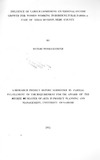| dc.description.abstract | Despite modernization of production, horticulture remains a labour intensive sector, with labour accounting for 50-60 percent of farm costs. A significant amount of this employment is temporary and female. Gender segregation is common with men occupying more senior permanent positions and women concentrated in more insecure temporary positions. The temporary class of workers does not benefit from the security and legislated entitlements of permanent employment, and often do not even receive those benefits to which they are legally entitled as temporary workers.
Better incomes and employment conditions are generally found at higher levels of the hierarchy .Workers at the lower end especially the non-permanent experience low wages and increasingly insecure employment. It is in this perspective that the research study intended to investigate what factors have contributed to these unfavorable labour conditions and how they affect personal income growth of women working in horticultural farms.
The objectives of this study were to investigate the influence of training on personal income growth, influence of gender on personal income growth and influence of labour codes of practice used in the horticultural sector on personal income growth for women. Three farms were sampled using simple random sampling technique. A sample size of 100 workers was determined using stratified random sampling. These farms are located in Timau Division, Meru County. These farms were: Finlays, Tima and Lobelia.
The research design employed was descriptive design. Data were collected using questionnaires and interview schedules. Data was analyzed using statistical package for social sciences (SPSS).Results was presented in frequencies, percentages and tables. The results of the study indicated that the kind of training offered had little influence on employees income. The influence of gender on income growth was pronounced.
Most of unaddressed gender issues limited personal income growth of women. However labour codes of practice issues had strong influence on income growth of employees. Based on study findings it was revealed that when labour issues were addressed personal income of women would be enhanced. However recommendation were made for further research on areas that were not exhaustively researched on. | en_US |

